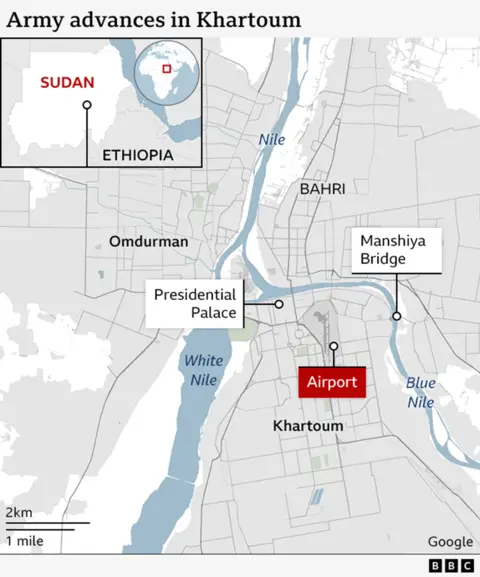Sudan’s military leader, Gen Abdel Fattah al-Burhan, has visited the presidential palace in Khartoum, after landing at the city’s international airport, just hours after it was recaptured by the army.
Surrounded by cheering soldiers at the venue – a significant symbol of absolute power and sovereignty – Burhan declared the capital “free” of the paramilitary Rapid Support Forces.
“Khartoum is free, it’s done,” said Burhan.
This is believed to be the first time Burhan has set foot in the presidential palace since the start of the war almost two years ago.
The military-led government was forced to move to Port Sudan on the Red Sea after the RSF seized control of the capital early in the war.
Earlier, an army commander told the BBC that his troops had fully secured the airport and expected to be able to clear the rest of the RSF fighters by the end of day.
The army has been moving swiftly since recapturing the presidential palace on Friday and seizing state institutions taken by the RSF.
The RSF had controlled most of Khartoum since the war began in April 2023. Nationwide, hundreds of thousands have been killed, and millions have been forced to flee their homes.
A army spokesperson also said that troops had recaptured all the bridges over the River Nile that connect the three cities which make up Greater Khartoum, along with a military camp in Jebel Awliya, the group’s stronghold in southern Khartoum
Residents have been reporting this week that RSF fighters were retreating southwards, apparently towards Jebel Awliya, the only exit route left to them.
Drone footage released by the army showed people crossing a bridge over the dam there. The BBC wasn’t able to verify who they were, but the military said it was RSF fighters fleeing Khartoum.
Videos posted on social media appeared to show some people in central Khartoum celebrating the army’s advance after what many have described as a brutal RSF occupation.
Those unwilling or unable to leave have consistently reported mass looting by the RSF, whose fighters took over civilian homes.
Also See: Congo and Rwanda Commit to Ceasefire in Surprise Qatar Meeting
Khartoum is one of the areas of the country the UN said was nearing famine conditions, because of looted markets and restrictions on aid by both sides.
Rights groups have also documented sexual violence and other abuses.
Both the RSF and the army have also been accused of indiscriminately shelling civilian areas.
Earlier this week, the air force bombed a market and eyewitnesses said dozens of civilians were killed.
Recapturing Khartoum is an enormous achievement for the army, which could give it a strategic advantage in the war.
But the war is far from over.
The RSF still holds almost all the Darfur region in western Sudan.
Both sides are backed by foreign powers who have poured weapons into the country, and international efforts to broker peace have failed.

This news is sourced from BBC and is intended for informational purposes only.

![Sudan’s army, led by Gen Burhan, recaptures Khartoum and the presidential palace as RSF fighters retreat. War rages on. [Image via Reuters]](https://southasiatimes.org/wp-content/uploads/2025/03/b6615890-0a80-11f0-9701-b7018d26a2d0.jpg.webp)




![Prime Minister Narendra Modi with External Affairs Minister S. Jaishankar at an official event. [Photo Courtesy: Praveen Jain via The Print].](https://southasiatimes.org/wp-content/uploads/2026/02/20-scaled-e1755601883425-1024x576-1.webp)